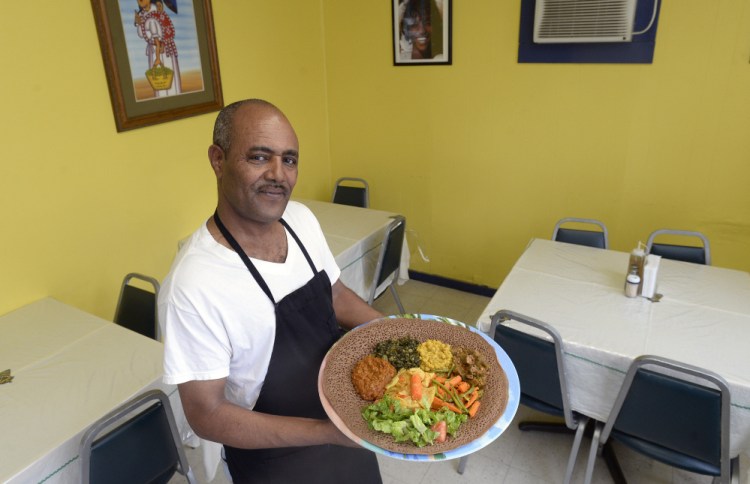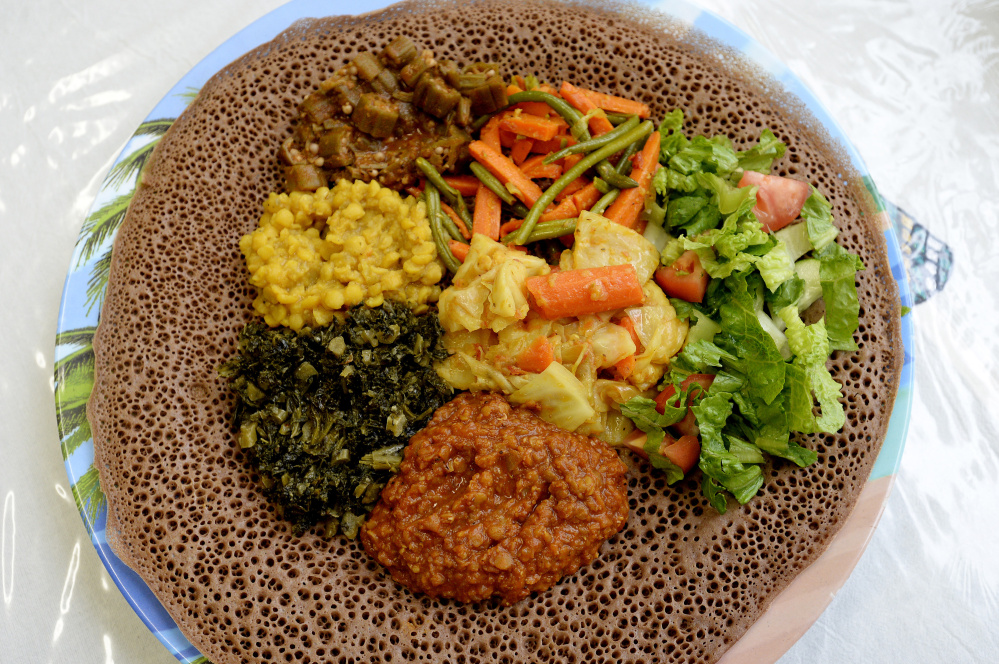I once asked my friend Ababa why she thought her region’s cuisine – perhaps more than any African cooking except Moroccan – had become so popular in the United States. “That’s easy,” she responded, “Ethiopian food is like that terrible cheese pot you all eat here.” “Fondue?” I asked, bemused. “Yes. You can’t eat that without being social. Our food is the same way. It forces you to talk, but it tastes a lot better than a bowl of cheese,” she said.
Regardless of how you feel about melted Gruyere, she had a point. It’s nearly impossible to imagine sitting in silence around a big common platter of thick vegetable stews and meats, tearing rough, irregular pieces of spongy, slightly sour injera bread and eating with your hands. Talking, whether to ask permission to dip into the lentils or to grab the one lonely, sauce-kissed hard-boiled egg, is as much a part of the meal as the dishes themselves.
No surprise then that Yemane Tsegai, co-owner and manager of Washington Avenue’s Red Sea Restaurant in Portland, is a big proponent of dinnertime chatter. “It’s how you keep your culture from generation to generation or share your culture. You eat, you talk,” he said. The meter-wide family-style platters of finger food prepared by his wife, co-owner and chef Akbret Batha, certainly grease the wheels of conversation in the garish but cheerful, six-table yellow dining room, especially if you happen to be visiting with someone who has never eaten Ethiopian or Eritrean food before.
But all the conversations at Red Sea aren’t about novelty – there is just as much to say about the quality of the food, which is, on balance, very high. Batha is at her best with her spiciest dishes, made with her own personal spice blends, including both dry and wet versions of traditional berbere. Compounded from cumin, jalapeño, garlic and Ethiopian black cardamom (along with a few other secret ingredients), Batha’s berbere sings with nutty, smoky flavors and stings with arrow points of fiery heat.
In her beef sambusas ($5), crispy, deep-fried triangular parcels of phyllo-style dough filled with ground beef and onion, berbere comes through with every bite, never letting you forget that you’re eating something exponentially more interesting than hamburger. It is a shame that Batha uses “only a tiny bit” of her bespoke blend in the lentil version of the same dish; the starchy legumes need more of a jump-start if they want to compete with their beefy cousins.
Batha’s spice mix is also the star of her tsebhi birsen, a loose red lentil stew that is served on its own ($12) or as part of the colossal vegetarian sampler ($26) which purports to be for two people, but could easily feed three, especially when you factor in the delightful homemade injera that both sits beneath and accompanies every plated meal in the restaurant. If you’re not a fan of peppery heat, the sampler includes several milder dishes, such as an outstanding alicha ($12), featuring slow cooked cabbage and chunks of potato and carrot. The tumtumo ($12), a thick yellow lentil stew, is also mild – but perhaps too close to the border that mild shares with bland. That said, there’s plenty of flavor in the sampler’s other two dishes, okra lightly stewed with tomatoes and garlic ($12), and hamli ($12), a blend of mustard greens and kale, simmered with a knockout combination of jalapeño, garlic and peppers.
While Red Sea offers plenty of vegetarian options, its concise menu also features meat and fish dishes, like the filling and massively portioned lamb fitfit tibsi ($14), a dish made from sauteed minced lamb and berbere that is finished by crushing pieces of injera into the mix. There is something very meta about eating a lamb-and-bread stew with torn strips of yet more bread.
Several of the restaurant’s meat dishes also rely on a shared mother sauce of red peppers, wet berbere, onions and a harvest’s worth of tomatoes – a sauce that simultaneously borrows from and thumbs its nose at Italian culinary traditions introduced during the occupation of Ethiopia and Eritrea.
Amazingly, using a common base for many items does not lead to the monotony or uniformity of flavors you might expect. “We can use the same sauce but make it taste very different because of two things: the flavor of the meat and the way we cook with the sauce,” Tsegai told me. In the tsebhi dorho ($13), chicken drumsticks and thighs are simmered slowly in a bath of the mother sauce until they are cooked through but still juicy. The result is rich, with a strong acidity from the tomato, and wonderfully messy, so be sure to have an extra few strips of injera waiting – this is not first-date fare.
Our favorite dish of the evening, the perfectly flaky Eritrean-style haddock ($13), began with the same base sauce, but expanded into a more sophisticated layering of flavors, from gentle, green astringency to a clear, spicy heat that was much more pronounced here than in the chicken. It’s hard to imagine a better way of connecting the best of the North Atlantic to the Horn of Africa, especially when you realize that this remarkable dish comes out of a kitchen the size of a minivan.
When my companions and I started winding down our meal, Tsegai (who is the restaurant’s only server, as well as its manager) checked in, but never hurried us along, never pushed us to order the restaurant’s only dessert, baklava ($4). Perhaps because, after two years helming Red Sea, he understood better than we did that we would continue to chat and nibble away at what remained on the platters in front of us – especially the injera, which soaked up more sauce and got better and better with every passing minute. Meals at Red Sea, it seems, happen at their own leisurely pace, and when you’re finished with your food, you don’t rush things. You do what comes naturally – you talk.
Andrew Ross has written about food in the United Kingdom and in New York, where he co-founded NYCnosh, a food website. He and his work have been featured on Martha Stewart Living Radio and in The New York Times. He is an Internet researcher and higher education consultant. Contact him at:
Twitter: @AndrewRossMEv
Send questions/comments to the editors.




